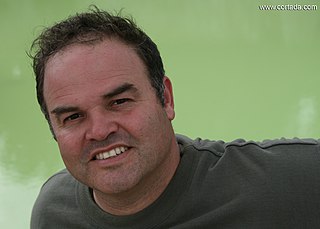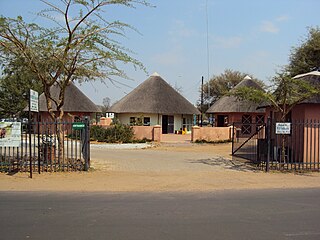Related Research Articles

Minamata is a city located in Kumamoto Prefecture, Japan. It is on the west coast of Kyūshū and faces Amakusa islands. Minamata was established as a village in 1889, re-designated as a town in 1912 and grew into a city in 1949. As of March 2017, the city has an estimated population of 25,310 and a population density of 160 persons per km². The total area is 162.88 km².

Litter consists of waste products that have been discarded incorrectly, without consent, at an unsuitable location. Litter can also be used as a verb; to litter means to drop and leave objects, often man-made, such as aluminum cans, paper cups, food wrappers, cardboard boxes or plastic bottles on the ground, and leave them there indefinitely or for other people to dispose of as opposed to disposing of them correctly.

Xavier Ignacio Cortada is a Cuban-American eco-artist, public artist and former lawyer. As a National Science Foundation Antarctic Artists and Writers Program fellow and a New York Foundation for the Arts Sponsored Artist, Cortada created works at the North Pole and South Pole to generate awareness about global climate change.

Virginia Key is an 863-acre (3.49 km2) barrier island in Miami, Florida, United States in Biscayne Bay, south of Brickell and north of Key Biscayne. It is accessible from the mainland via the Rickenbacker Causeway.
The Kimpton Hotel & Restaurant Group, LLC is a San Francisco, California, based hotel and restaurant brand owned by IHG Hotels & Resorts (IHG) since 2015. Founded in 1981 by Bill Kimpton and led by Chief Executive Officer Mike DeFrino, the group was the largest chain of boutique hotels in the United States in 2011. It currently operates 68 hotels with a total of 13,357 bedrooms. New hotels have been announced for Indianapolis, Los Angeles, Paris, Barcelona, Frankfurt, Grenada, Bali, Tokyo, Shanghai, Hong Kong, Rotterdam and Sanya.

Keep America Beautiful is a nonprofit organization founded in 1953 based in Stamford, Connecticut. It is the largest community improvement organization in the United States, with more than 700 state and community-based affiliate organizations and more than 1,000 partner organizations.

The Miami Beach Botanical Garden is a 2.6 acres (1.1 ha) urban green space in Miami Beach, Florida founded in 1962. It was transformed in 2011 with a $1.2 million landscape renovation designed by South Florida landscape architect Raymond Jungles. The new landscape showcases native Florida plants and trees including bromeliads, palms, cycad, orchids and many others. There is a Japanese garden, native garden and bio-swale, and water gardens including ponds, fountains, and a wetland with mangrove and pond apple trees. The renovation also expanded the Great Lawn area for corporate and social events, established a plant nursery and event plaza, and enhanced the night-time lights, entrance gate, and pathways.

Project AWARE is a registered nonprofit organization working with volunteer scuba divers. With offices in UK, US, and Australia, Project AWARE supports divers acting in their own communities to protect the ocean, with a focus on implementing lasting change in two core areas: shark conservation and marine litter.

The sustainable city, eco-city, or green city is a city designed with consideration for social, economic, environmental impact, and resilient habitat for existing populations, without compromising the ability of future generations to experience the same. The UN Sustainable Development Goal 11 defines sustainable cities as those that are dedicated to achieving green sustainability, social sustainability and economic sustainability. They are committed to doing so by enabling opportunities for all through a design focused on inclusivity as well as maintaining a sustainable economic growth. The focus also includes minimizing required inputs of energy, water, and food, and drastically reducing waste, output of heat, air pollution – CO2, methane, and water pollution. Richard Register first coined the term ecocity in his 1987 book Ecocity Berkeley: Building Cities for a Healthy Future, where he offers innovative city planning solutions that would work anywhere. Other leading figures who envisioned sustainable cities are architect Paul F Downton, who later founded the company Ecopolis Pty Ltd, as well as authors Timothy Beatley and Steffen Lehmann, who have written extensively on the subject. The field of industrial ecology is sometimes used in planning these cities.
An eco hotel, or a green hotel, is an environmentally sustainable hotel or accommodation that has made important environmental improvements to its structure in order to minimize its impact on the natural environment. The basic definition of an eco-friendly hotel is an environmentally responsible lodging that follows the practices of green living. These hotels have to be certified green by an independent third-party or by the state they are located in. Traditionally, these hotels were mostly presented as ecolodges because of their location, often in jungles, and their design inspired by the use of traditional building methods applied by skilled local craftsmen in areas, such as Costa Rica and Indonesia.

The effects of Climate change in Florida is attributable to man-made increases in atmospheric carbon dioxide. Floridians are experiencing increased flooding due to sea level rise, and are concerned about the possibility of more frequent or more intense hurricanes.

Society for the Protection of Nature in Israel, or SPNI, is an Israeli non-profit environmental organization working to preserve plants, animals, and natural environments that represent bio-diversity, by protecting the lands and waters needed for their survival, and is Israel's oldest and largest conservation organization.

Somarelang Tikologo is a member-based environmental NGO located in Gaborone, Botswana. The aim of the organization is to promote sustainable environmental protection by educating, demonstrating and encouraging best practices in environmental planning, resource conservation and waste management in Botswana.
Green Action Centre is an environmental non profit organization based in Winnipeg, Manitoba. It works to promote greener living through environmental education for households, workplaces, schools, and communities. It also develops and advocates environmental policies for Manitoba communities. Its primary areas of activity include green commuting, composting and waste, sustainable living and resource conservation.
Michael Christian Góngora is an American politician and lawyer from Miami Beach, Florida who is currently serving his third term as Commissioner of the City of Miami Beach City Commission. Gongora was first elected in 2006 and most recently in 2017. Besides his legal practice, Gongora currently serves as a legal and political analyst and is regularly featured on many Spanish networks including Telemundo, America Teve and Mira TV.

Sustainability, as defined by the 1983 Brundtland Commission, formally the World Commission on Environment and Development (WCED), states “development which implies meeting the needs of the present without compromising the ability of future generations to meet their own needs”. As sustainability gains support worldwide, universities across the United States have begun to take initiatives toward more sustainable campuses. Alongside student-run projects, drastic changes in administration, energy efficiency, food, and recycling have sprung up in Ivy League schools and liberal arts colleges alike. The American College & University Presidents' Climate Commitment is an evident effort to address global climate disruption consisting of a network of colleges and universities that have made institutional commitments to reduce net greenhouse gas emissions on campus and to promote the research and educational efforts of higher education to prepare society to re-stabilize the earth's climate. Oberlin College in Ohio features the first Leadership in Energy and Environmental Design (LEED) Gold certified music facility, while Yale University in New Haven, Connecticut, has pledged that all new buildings will meet these same Gold standards. LEED is an internationally recognized green building certification system created by the U.S. Green Building Council. This ranking system offers an incentive for building owners to implement green design, construction, efficient operations, and eco-friendly solutions over the years. Buildings are responsible for about 40% of total carbon emissions. And so by including these green buildings, schools are decreasing carbon emissions, conserving water and energy and saving money each month. Princeton and Ohio University have both made strides toward cutting yearly carbon emissions on campus; While Florida Gulf Coast University has implemented solar energy throughout various buildings. A number of universities across the U.S. have created bicycle stations providing rentals to students and staff alike in an effort to reduce the burning of fossil fuels and automobile congestion as well. Car sharing like rechargeable Zipcars and reliable public transit have also helped incentivize more eco-friendly schools. These changes towards sustainability offer colleges moral and ethical fulfillment as well as economic and financial benefits. Likewise, these universities are responsible for training future generations in sustainable practice. By offering students these more Earth-friendly options, faculty and staff can ensure the well-being of lands and resources for generations to come.
IDEAS For Us is a United Nations–accredited non-governmental organization which works to advance sustainability through local action projects in countries and on campuses around the world. IDEAS For Us focuses on reaching communities furthest from sustainable development and advancing the global goals for sustainable development by helping to develop, fund, and scale local action projects from within communities which have the potential to grow into ongoing programs. IDEAS For Us has three major programs: Fleet Farming, the Hive, and the Solutions Fund.

Miami has one of the largest and most prominent LGBTQ communities in the world. Miami has had a gay nightlife scene as early as the 1930s. Miami has a current status as a gay mecca that attracts more than 1 million LGBT visitors a year. The Miami area as a whole has been gay-friendly for decades and is one of the few places where the LGBTQ community has its own chamber of commerce, the Miami-Dade Gay and Lesbian Chamber of Commerce (MDGLCC). As of 2005, Miami was home to an estimated 15,277 self-identifying gay and bisexual individuals. The Miami metropolitan area had an estimated 183,346 self-identifying LGBT residents.

Beach cleaning or clean-up is the process of removing solid litter, dense chemicals, and organic debris deposited on a beach or coastline by the tide, local visitors, or tourists. Humans pollute beaches with materials such as plastic bottles and bags, plastic straws, fishing gear, cigarette filters, Six pack rings, Surgical mask and many other items that often lead to environmental degradation. Every year hundreds of thousands of volunteers comb beaches and coastlines around the world to clean this debris. These materials are also called “marine debris” or "marine pollution" and their quantity has been increasing due to anthropocentric activities.
Keep Scotland Beautiful is an environmental charity based in Scotland, which aims “to make Scotland a cleaner, greener and more sustainable place to live, work and visit.” The organisation campaigns and educates on a range of environmental issues including climate change and litter reduction.
References
- ↑ Official City of Miami Beach Press Release: Celebrate An Island With Monumental History [ permanent dead link ]
- ↑ "Sun Post Weekly: EcoMB's FunDay At The Beach". Archived from the original on 2011-03-16. Retrieved 2011-03-17.
- ↑ Lime Light Times: Artist Inspired Litter Awareness on South Beach
- ↑ Miami New Times: Interview Luiz Rodrigues
- ↑ Beached Miami: Miami Beach's First One Stop Recycling Center
- ↑ Community News: A Green Dream Come True